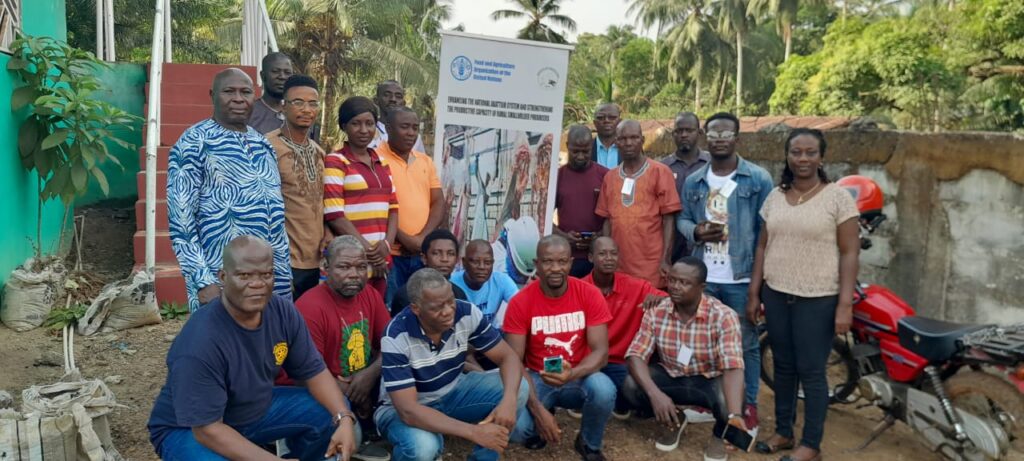FAO & Partners Train Farmers in Animal Health Surveillance

By: Stanley Kolubah Johnson, Margibi County Correspondent
Margibi – United Nations Food Agriculture Organization(FAO) and the Liberian Government through the Ministry of Agriculture recently completed the training of twenty (20) farmers in animal health surveillance.
The training which took place in Margibi County, drew participants from three other counties including Montserrado, Nimba and Lofa counties.
The five days training exercise was intended to complement efforts of the Ministry of Agriculture to ensure effective and quality animal health Surveillance delivery in Liberia.
The training also aimed intended at strengthening the technical capacities of inspectors, lab technicians, animal health surveillance officers and other sub-sector actors, including butchers, (through training and provision of requisite tools, equipment and technologies) to increase contribution to the animal slaughtering and inspection system; including knowledge on Good Hygienic Practices (GHPs), Good Manufacturing Practices (GMPs), and Sanitation Standard Operating Procedures (SSOPs), BS and BS international standards; and surveillance and sample collection capacities.
According to FAO Regional Food Safety and Quality officer for Africa, Dr. Blaise Ouattara, the dependence on imports of meat and meat products and the capture of wildlife to meet the protein requirement of the population is associated with consequent environmental and public health impacts; adding that it is partly linked to the inadequacy in local livestock production/rearing, as well as the limited slaughtering and meat inspection capacity of the country.
Accordingly, Dr. Ouattara stressed that many abattoir operators and livestock farmers in Liberia are aware of the sectors economic potential.
However, despite its potential, livestock processors have limited resources and capacity to improve meat and meat product processing facilities that promote Good Manufacturing Practices (GMPs) and Good Hygienic Practices (GHPs).
“The livestock industry of Liberia has the potential to significantly contribute to food security, nutrition and income generation for animal farmers and meat processors; meanwhile, there is still a limited supply of cattle, goats, sheep, swine and poultry”, he added.
The FAO Regional Food safety and Quality Officer for Africa at the same time stressed that Food safety is a significant public health issue worldwide, particularly in emerging and developing countries.
“It has also become one of the most challenging that need to be addressed in Liberia. Supporting the development of the appropriate animal slaughtering environment and meat inspection system is critical for public health protection and a sustainable abattoir management system”.
A report from the Ministry of Agriculture shows the demand for livestock products greatly outstrips local supply, and as a result, imports of livestock products and live animals are high.
The report added that an estimated 19,580 – 26,000 heads of live cattle, 15,000 -16,000 heads of live sheep and goats are imported from Guinea, Cote dIvoire and Mali annually for slaughter. Similarly, the total demand in 2015 was projected at 43,564 and 37,624 tones for meat and milk respectively; with the projection of an increase of 121% by 2020. Animal safety to improve food safety is being stressed. Handling animals, how they are killed and how they managed for safe consumption.
He included the increased knowledge and technical understanding for GMPs and GHPs in slaughter facilities and Paid field visits to slaughter facilities for experience sharing as part of the focus point of the training conducted.
The training was conducted under the theme “Enhancing the National Abattoir System and strengthen the productive Capacity of Rural Smallholder producers”.
Also speaking, the Director of Animal Production at the Ministry of Agriculture Roland Varkpeh FAO and partners for creating the corridor for Animal health surveillance officers and other sub-sector actors, including butchers with provision of requisite tools, equipment and technologies to increase contribution to the animal slaughtering and inspection system.
Mr. Varkpeh welcomed the capacity building of more Liberian Small holder farmers on animal production; nothing that the process will curtail citizens getting animal from other African countries like Mali, Burkina Faso, Togo, Guinea and among others.
“Liberia has been left behind in animal production due to less training host for those involved in such activities. More African countries involved in animals production are promoting their countrys agriculture sector and creating employment for citizens”, Varkpeh averred.
According to the Ministry of Agriculture, the demand for livestock products greatly outstrips local supply, and as a result, imports of livestock products and live animals are high. “An estimated 19,580 – 26,000 heads of live cattle, 15,000 -16,000 heads of live sheep and goats are imported from Guinea, Cote D’Ivoire and Mali annually for slaughter. Similarly, the total demand in 2015 was projected at 43,564 and 37,624 tones for meat and milk respectively; with the projection of an increase of 121% by 2020”.
He assured Agriculture Ministry’s commitment to ensure the continuation of technical trainings to place Liberia among countries that are exporting meat to other parts of Africa.
On behalf of the participants, Sarima Sakama expressed gratitude FAO and the government for the quick intervention into the challenge of animal production workers and staffs.
Miss Sakama lamented that animal health surveillance and other sub-sector actors cross the country has been lack of knowledge and skills which accordingly has caused problems for them while in the process of slaughtering, busters, and inspectors.
She urged her colleagues to see the training as an opportunity created to build them while looking for earnings for their family.
Sarima Sakama at the same time called on FAO and the government of Liberia to aid them with the necessary materials which will improve their workings.



